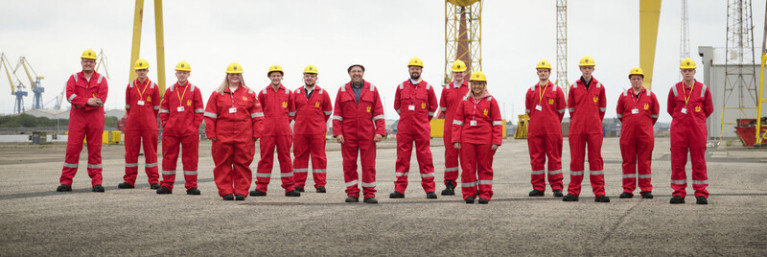Displaying items by tag: InfraSrata
Shipyard Harland & Wolff Welcome Apprentices Across All Four Sites
Shipyard Harland & Wolff, with over 160 years of maritime and offshore engineering pedigree, has taken on 34 new apprentices across all of its four sites as part of its first ‘Apprentice Induction Event.’
H&W a wholly-owned subsidiary of InfraStrata plc, has the four sites located in Appledore (England), Arnish (Isle of Lewis), Belfast and Methil (Scotland).
The apprenticeship scheme will run in line and with partnerships from; Petroc College for Harland & Wolff (Appledore), Northern Regional College for Harland & Wolff (Belfast), Lews Castle College for Harland & Wolff (Arnish) and Fife College for Harland & Wolff (Methil).
The newest intake ranges from 16 – 38 years old, with a mixture of genders.
John Wood, Group CEO commented: “Over the past two weeks, we’ve been excited to welcome our first intake of apprentices since we acquired Harland & Wolff. Focused on offering high quality employment and green jobs, we are fully committed to paving the way for the next generation of UK maritime trades".
He added "Our apprentices will be working across five markets, including defence, energy and renewables, where they will be actively contributing to Net Zero infrastructure and green shipbuilding. With no better location to begin their professional careers, we now not only look forward to watching them grow with us but to building a lasting and successful apprenticeship scheme.”
Harland & Wolff Apprenticeships are offered across three distinct functions, Trade, (welders, pipefitters, electricians, riggers, fabricators, etc) Technical, (engineers, naval architecture) and Business Support (sales, administration).
H&W is a multisite fabrication company, operating in the maritime and offshore industry through five markets: commercial, cruise and ferry, defence, oil & gas and renewables and six services: technical services, fabrication and construction, decommissioning, repair and maintenance, in-service support and conversion.
Its yard on Belfast Lough is one of Europe’s largest heavy engineering facilities, with deep water access, two of Europe’s largest drydocks, ample quayside and vast fabrication halls.
As a result of the acquisition of Harland & Wolff (Appledore) in August 2020, the company has been able to capitalise on opportunities at both ends of the ship-repair and shipbuilding markets where this will be significant demand.
In February 2021, the company acquired the assets of two Scottish based yards along the west and east coasts. Now known as Harland & Wolff (Arnish) and Harland & Wolff (Methil), these facilities will focus on fabrication work within the renewable, oil and gas and defence sectors.
As referred above, InfraStrata plc (AIM: INFA) is a London Stock Exchange-listed firm focused on strategic infrastructure projects and physical asset life-cycle management.
In addition to Harland & Wolff, it owns the Islandmagee gas storage project in Co. Antrim. The project is expected to provide 25% of the UK’s natural gas storage capacity and to benefit the Northern Irish economy as a whole when completed.

























































